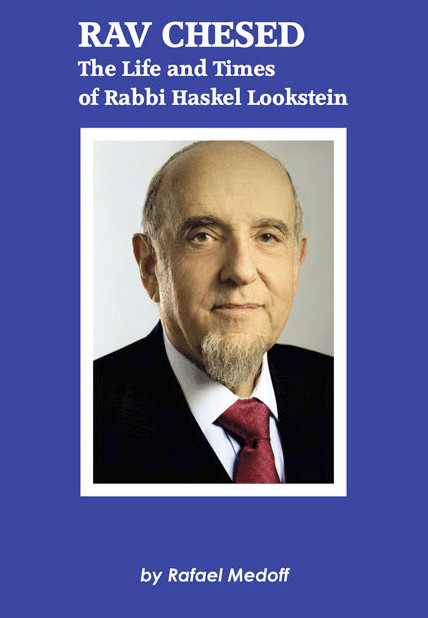Kosher Bookworm: Of fire and death: The Lookstein legacy
Sometimes an eloquent quote reflecting an event can take on a life of its own and reflect events not originally intended by its author. Such was the case recently in a quote made by Rabbi Haskel Lookstein reflecting upon the fi re that destroyed his shul, Kehilath Jeshurun of Manhattan. Noting that there were no casualties the rabbi made an interesting , and in retrospect, timely observation in describing the “catastrophic” fire.
He elaborated on this choice of words stating as follows: “I use the word catastrophe rather than tragedy. Tragedy is when lives are lost and people are critically injured. In that sense, there was no tragedy last night. Thank G-d, there was no loss of life; there wasn’t even a loss of Torah scrolls… Last night was catastrophic, but not tragic.” This most astute dichotomy became even more timely given the events that were to follow in train within 24-hours in nearby Brooklyn. What started this week as a catastrophe for the New York Jewish community ended with a devastating tragedy with the brutal murder of Yehudah Leib Kletzky, a”h, an eight-year-old yeshiva boy in Borough Park. Compounding this tragedy was that the murderer to its very core.
I will leave it to others to elaborate further upon the details of this tragedy that brought the Three Weeks a full week earlier. Rather, I choose to write about the author of that profound quote as noted above, whose life’s story is an apt reflection upon all that is good about our faith and its people especially here in New York.
When I went to Yeshiva University one of my favorite lecturers who visited us on occasion was Rabbi Dr. Joseph Lookstein. At that time of my life it was he who represented to me what I envisioned as the ideal pulpit rabbi. As the years passed, in my activities on behalf of Russian Jewry I came to observe close up the leadership of his son and successor, Rabbi Dr. Haskel Lookstein, who together with Jacob Birnbaum, Rabbi Gilbert Klapperman, Rabbi Abraham Joshua Heschel, and others retrieved American Jewry’s blemished reputation in its response to the Holocaust two decades before, with effective action that ultimately led to Russian Jewry’s release from communist captivity.
In the half century since, much has happened to record and remember Rabbi Lookstein’s leadership. Rabbi Lookstein’s life story can now be found in an essay in volume two of a two volume tribute of essays in honor of the rabbi’s “Rav Chesed” published by Ktav Publishing House in 2009, and edited by the distinguished historian and essayist Dr. Rafael Medoff, Rabbi Lookstein’s career as an educator and rabbi is given full play in an essay of the same title by the book’s editor. Within this essay can be found the roots of a man that helped generate the type of leadership he was to exhibit both as a spiritual leader, an orator, a writer, teacher and community activist who influenced events for generations to come.
His legacy is reflected in the success that his shul, and the Ramaz yeshiva, has had on what was previously spiritually barren territory on New York’s affluent Upper East Side. Through his leadership as reflected in the events detailed in Dr. Medoff’s essay can be found the formula for the involvement of personalities who might otherwise never would have involved themselves in Jewish communal affairs. It was through these activities that both astute advice and financing was brought into play that helped make the New York Jewish community the effective kehillah it was to become.
These two volumes contain some of the finest Jewish scholarship of recent times, much written in tribute to Rabbi Lookstein. In it is to be found such distinguished writers as Rabbi Norman Lamm, Dr. Adam Ferziger, Rabbi Michael Broyde, Rabbi Aharon Lichtenstein, Rabbi Meir Soloveitchik, Dr. Jonathan Sarna, Dr.
Sandra Rapoport, Dr. Aviva Zornberg, and the ultimate nachas, Rabbi Lookstein’s son, Rabbi Joshua Lookstein.
Taken together, with the many other writers and their excellent essays, this work totals over 1,000 pages. This indeed is an impressive tribute to an impressive career, which I highly recommend for your reading pleasure. I wish to conclude this week’s essay with the following two quotes, as reality dictates, reflect upon the sad events that enveloped our community these past weeks.
The first is by Rabbi Lookstein, commenting on the fire at his shul, a quote that accurately places into proper perspective his leadership qualities: “I know this community and I am confident that we will not look back in anger but rather look ahead with confidence, determination and hope. With G-d’s help, we will rebuild what we have lost and this sanctuary and our community will be more beautiful than ever.”
In tribute to Yehudah Leib Kletzsky, hy”d, we have the following quote from Jeremiah that we will read on Tisha B’Av: “For death is come up into our windows, and is entered into our palaces, to cut off the children from the streets and the young men from broad places.”
Read these prophet’s words carefully, and meld them with the optimism as expressed by Rabbi Lookstein. Learn from them the admonition as well as hope that they each teach us for only then will we truly come to appreciate the dichotomy between catastrophe and tragedy.

 47.0°,
Mostly Cloudy
47.0°,
Mostly Cloudy 




